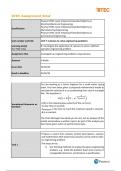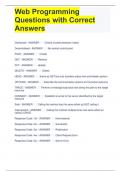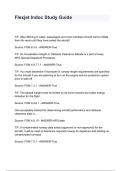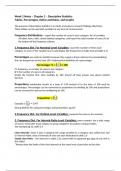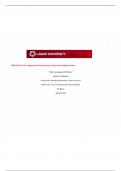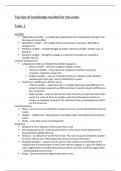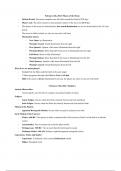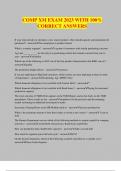Pearson BTEC Level 3 National Extended Diploma in
Electrical/Electronic Engineering
Pearson BTEC Level 3 National Extended Diploma in
Qualification
Manufacturing Engineering
Pearson BTEC Level 3 National Extended Diploma in
Aeronautical Engineering
Unit number and title Unit 7: Calculus to solve engineering problems
Learning aim(s) C: Investigate the application of calculus to solve a defined
(For NQF only) specialist engineering problem
Assignment title Investigate an engineering problem using Calculus
Assessor S.Walsh
Issue date 25/01/22
Hand in deadline 22/02/22
You are working as a Junior Engineer for a small motor racing
team. You have been given a proposed mathematical model to
calculate the velocity of a car accelerating from rest in a straight
line. The equation is:
𝒕
−
𝒕𝒎𝒂𝒙𝒔𝒑𝒆𝒆𝒅
𝒗(𝒕) = 𝑨 (𝟏 − 𝒆 )
𝒗(𝒕) is the instantaneous velocity of the car (m/s)
Vocational Scenario or
Context t is the time in seconds
𝒕𝒎𝒂𝒙𝒔𝒑𝒆𝒆𝒅 is the time to reach the maximum speed in seconds
A is a constant.
The Team Manager has asked you to carry out an analysis of the
model and produce a written report. As part of the analysis you
have been given some car performance data.
Produce a report that contains written descriptions, analysis
and mathematics that shows how calculus can be used to solve
an engineering problem.
Task 1 The steps are to:
● Use thinking methods to analyse the given engineering
problem, e.g. break the problem down into a series of
manageable elements, and produce a specification.
, ● Prepare a valid proposal for solving the problem and
present it.
● Produce mathematical models for the identified
elements of the problem.
● Apply calculus methods to produce answers for each
of the elements.
● Bring the elements together in a formal presentation.
In your presentation, you need to outline the problem and the
methods needed to solve it. You need to include how to;
1. Identify the
● units of the coefficient A
● physical meaning of A
● velocity of the car at t = 0
● asymptote of this function as t → ∞
2. Sketch a graph of velocity vs. time.
3. Derive an equation s(t) for the displacement of the car as a
function of time. Identify the
● displacement s when t = 0 s
● asymptote of this function as t → ∞
4. Sketch a graph of displacement vs. time.
5. Derive an equation 𝑎(𝑡) for the instantaneous
acceleration of the car as a function of time. Identify the
● acceleration of the car at t = 0 s
● asymptote of this function as t → ∞
6. Sketch a graph of acceleration vs. time.
7. Apply your mathematical models to your allocated car.
Use the given data for the 0 – 28 m/s and 400m times to
calculate the:
● value of the coefficient A
● maximum velocity
● maximum acceleration.
Checklist of evidence Your formal presentation should contain:
required
● specification of the problem,
● analysis using graphical software,
● worked solutions to the problems.
Each worked solution should be laid out clearly and contain brief
explanations of the stages of the calculation to indicate your
understanding of how calculus can be used to solve an
engineering problem. Diagrams and sketches should be well
presented and clearly labelled.
2
BTEC Assignment Brief v1.0
BTEC Internal Assessment QDAM January 2015
,Criteria covered by this task:
Unit/Criteria
To achieve the criteria you must show that you are able to:
reference
Critically analyse, using technically correct language and a logical structure,
7/C.D3 a complex engineering problem, synthesising and applying calculus and a
mathematical model to generate an accurate solution.
Analyse an engineering problem, explaining the reasons for each element
7/C.M3
of the proposed solution
Solve accurately, using calculus methods and a mathematical model, a
7/C.M4
given engineering problem.
7/C.P7
Define a given engineering problem and present a proposal to solve it
Solve, using calculus methods and a mathematical model, a given
7/C.P8
engineering problem
Sources of information http://www.mathsisfun.com/index.htm
to support you with this
Assignment http://www.mathcentre.ac.uk/students/topics
Other assessment Table of 0-28 m/s, 400m and time to reach maximum speed
materials attached to
this Assignment Brief
times.
Student t (0-28 t(400m) tmaxspeed
Car Model
Dataset m/s) (s) (s) (s)
1 1994 Ford SVT Boss Mustang 10.0L Concept 1.9 10.50 7.1
2002 Chevrolet Corvette (Lingenfelter 427 Twin
2 Turbo) 2.0 9.10 6.8
3 Bugatti Veyron 16.4 Grand Sport Vitesse - [2012] 2.5 9.21 10.2
4 Caterham 7 620 R 2.0 L Supercharged - [2013] 2.8 10.91 7.0
5 Ariel Atom V8 500 - [2008] 2.3 10.80 5.0
6 Bugatti Veyron 8.0 litre W16 Super Sport - [2010] 2.5 9.75 8.0
7 Caparo T1 2.4 V8 - [2006] 2.5 8.23 7.0
8 Hennessey Venom GT - [2010] 2.5 8.64 8.5
9 Radical RXC 3.5 V6 Twin Turbo - [2014] 2.6 10.46 7.0
10 Ascari A10 5.0 V8 - [2006] 2.8 10.36 7.8
11 Lamborghini Veneno 6.5 V12 - [2013] 2.8 9.92 8.5
12 Porsche 918 Spyder 4.6 V8 - [2013] 2.8 11.49 8.2
13 Caterham 7 Superlight R500 - [2009] 2.9 11.32 8.0
14 Ferrari F12 tdf 6.3 V12 - [2015] 2.9 10.18 7.4
3
BTEC Assignment Brief v1.0
BTEC Internal Assessment QDAM January 2015
,


